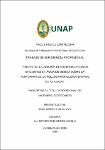Efecto de la adición de microorganismos eficientes en agua de bebida sobre la performance de pollos parrilleros en fase de acabado
Abstract
El Trabajo de Suficiencia Profesional titulado “Efecto de la adición de Microorganismos Eficientes en agua de bebida sobre la performance de pollos parrilleros en fase de acabado”, se realizó de marzo a abril del 2018, en la granja del Sr. Fermín Mozombite, ubicado en el asentamiento humano Miguel Irizar, Distrito Yurimaguas, Provincia Alto Amazonas, Región Loreto – Perú. El presente trabajo de investigación evaluó los índices productivos y económicos de la crianza de pollos parrilleros de 21 a 42 días de edad, adicionando microorganismos eficientes (EM) en el agua de bebida. Se utilizó 192 pollos parrilleros de la línea COBB con un peso promedio de 1.157 kg, los cuales fueron distribuidos en tres tratamientos; T0: 0 ml EM/L de H2O, T1: 1ml EM/L de H2O, y T2: 2 ml EM/L de H2O. Se utilizó el diseño completamente al azar con tres tratamientos, cuatro repeticiones y 12 aves por unidad experimental y la comparación de medias entre tratamientos se hizo mediante el test de Duncan (5%). Se encontró diferencia estadística (p<0.05) para el consumo de alimento, ganancia de peso diario y conversión alimenticia, en la fase de acabado. En conclusión, con 2 ml de microorganismos eficientes ocasionan mayor ganancia diaria de peso (55.970 gr), mejor consumo de alimento (173.86 gr.) y eficacia en la conversión alimenticia (1.94) en pollos de 21 a 42 días de edad, así mismo, reportaron mejor mérito económico (36.7%). The Professional Sufficiency Work entitled “Effect of the addition of Efficient Microorganisms in drinking water on the performance of broiler chickens in the finishing phase”, was carried out from March to April 2018, at the farm of Mr. Fermín Mozombite, located in the Miguel Irizar human settlement, Yurimaguas District, Alto Amazonas Province, Loreto Region - Peru. The present research work evaluated the productive and economic indexes of raising broiler chickens from 21 to 42 days of age, adding efficient microorganisms (ME) in the drinking water. 192 broiler chickens of the COBB line with an average weight of 1,157 kg were used, which were distributed in three treatments; T0: 0 ml ME / L H2O, T1: 1ml ME / L H2O, and T2: 2 ml ME / L H2O. The completely randomized design with three treatments, four repetitions and 12 birds per experimental unit was used and the comparison of means between treatments was made using the Duncan test (5%). Statistical difference (p <0.05) was found for feed consumption, daily weight gain and feed conversion, in the finishing phase. In conclusion, with 2 ml of efficient microorganisms they cause greater daily weight gain (55,970 gr), better feed consumption (173.86 gr.) And efficiency in feed conversion (1.94) in chickens from 21 to 42 days of age, likewise , reported better economic merit (36.7%).
Collections
The following license files are associated with this item:


